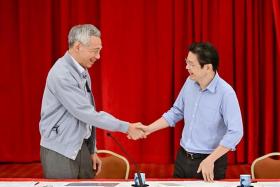Empowering citizens, planning ahead, diversity are key to governance
One of the key principles of governance in Singapore is to enable people to fulfil their potential regardless of their backgrounds and where they started in life, Deputy Prime Minister Heng Swee Keat said yesterday.
This means investing in early childhood education, providing multiple pathways to success, and helping citizens embrace lifelong learning so they can take on new jobs and keep up with technological advancements, he said in a keynote address at an international conference in Singapore on governance.
The Government also works with the community to build a society that provides opportunities. One way is to partner social workers and social service organisations to design and implement policies that help children with specific needs.
Empowering people to fulfil their potential is one of three principles of governance which have worked well for Singapore, Mr Heng told more than 550 conference participants at the Nanyang Technological University (NTU).
The other two are harnessing strength in diversity and planning with future generations in mind, he said.
"Good governance has enabled a small island nation without any natural resources, that depended solely on its people, to succeed," Mr Heng said, adding that there is still much more to learn from others.
The four-day conference was organised by NTU's Nanyang Centre for Public Administration and the International Institute of Administrative Sciences, a Belgium-based non-profit organisation, with funding support from the Lien Foundation.
Mr Heng said good governance is also to draw strength from diversity, through individuals who have different identities based on race, religion, gender, generation, socio-economic status and interests.
But diversity can become a point of division, he said. In some countries, intolerance and extremism are growing, breeding distrust and even violence.
"If we have a common call and draw strength from our differences, diversity can be an advantage," he said.
"By drawing on diverse ideas and perspectives to explore issues, we experiment with possible solutions, and finding common ground, we can overcome challenges and seize opportunities together."
He noted that Singapore's approach is "to integrate rather than assimilate our people". This means that no race or culture in Singapore is coerced into conforming with other cultures or identities.
Instead, over time, each race has retained and evolved its own culture and heritage, while integrating some of the customs and traditions of others, he said.
Singapore also maintains and grows common spaces and shared experiences, through initiatives such as the Ethnic Integration Policy to ensure a balanced mix of ethnic groups living in Housing Board estates, and national service.
Still, it is pressing on with efforts to build common understanding, said Mr Heng, citing as an example the Ask Me Anything community-led conversations, where religious leaders address misconceptions about their beliefs and practices.
Get The New Paper on your phone with the free TNP app. Download from the Apple App Store or Google Play Store now



